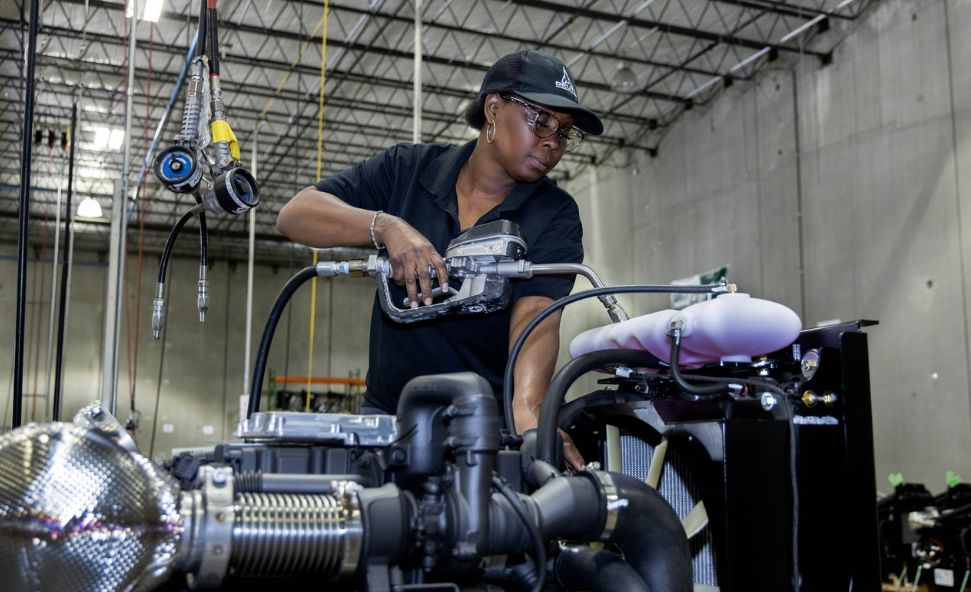
News | 4 min read
September 27, 2016

NORFOLK – Gov. Terry R. McAuliffe on Wednesday announced that The Port of Virginia has signed a new, long-term lease for Virginia International Gateway (VIG) that clears the way for the port to begin work on doubling capacity at the deep-water container terminal.
“This is an historic event for The Port of Virginia,” Gov. McAuliffe said. “This new lease helps to put the port on the path to long-term sustainability which, in turn, will result in continued job creation, investment and revenue for the Commonwealth.”
“Further, this sends a very clear message – world-wide — that The Port of Virginia is investing for the long-term and we will be able to service the vessels of any ocean carrier here at what will be one of the most modern and efficient container terminals in North America for decades to come.”
The new lease, which was negotiated during a two-year period, will give the port oversight of and operating rights at the terminal until 2065. Further, the lease allows the port to begin work on a $320 million project to build the terminal’s second phase; construction will begin this year. The lease is between the Virginia Port Authority (VPA) and Virginia International Gateway Inc., which is owned by Alinda Capital Partners and Universities Superannuation Scheme (USS). The lease is scheduled to go into effect Nov. 1.
“Within the existing footprint, we will have the capability and capacity to process a total of 1.2 million (container) lifts – 2 million TEUs — annually through VIG,” said Aubrey L. Layne, Virginia secretary of transportation. “The negotiation process was a collaborative effort with both the Alinda, USS team and the port making a significant investment in resources and time. Everyone worked together to reach this agreement knowing the long-term benefits to the port and throughout Virginia.”
Presently, VIG is processing 600,000 container lifts annually. The terminal is served by eight ship-to-shore cranes and has on-dock rail with service provided by both CSX and Norfolk Southern. The expansion will take an estimated three years to complete and result in a longer berth, an expanded rail operation, an expanded container yard and four new ship-to-shore cranes.
“The potential economic impacts of the build-out are significant,” said John G. Milliken, chairman of the VPA Board of Commissioners. “We anticipate this project creating thousands of new port-related jobs and generating hundreds of millions in state and local taxes and billions of spending and investment throughout the state.”
“Two years ago, when we began the work of re-elevating The Port of Virginia’s status, our goals were to create efficiency at our terminals, improve our delivery of service, put the port on a sustainable financial basis and expand our capacity to drive job and economic growth in Virginia. With today’s announcement we have set our growth path for the next 20 years and built a bridge to our long-term future, which is a terminal on Craney Island.”
Today’s news comes in addition to several recent announcements made by the port in its effort to reinvest and expand capacity. In August, Gov. McAuliffe announced $350 million in state funding to expand capacity at Norfolk International Terminals (NIT), which is the port’s other primary container terminal. Additionally, the port is nearing the mid-way point on construction of the North Gate complex at NIT – a 26-lane gate that will provide greater motor carrier access to the terminal and will tie into the I-564 connector, also under construction.
“We believe that the continued investment in people, technology and those capacity projects being undertaken here during the next three-to-four years are positioning The Port of Virginia to become the US East Coast’s premiere port: a true gateway to world trade and a catalyst for commerce in Virginia,” said John F. Reinhart, CEO and executive director of the VPA. “We are seeing vessels in the 10,000-plus TEU range, we are processing more rail cargo than ever and the demand for our services is growing. We have momentum and our timing coincides well with the changes in the industry.”
###